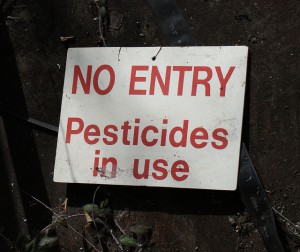Early exposure to pesticides leads to decreased lung function in children
A new study published by researchers from the Center for Environmental Research and Public Health at the University of California, Berkeley has linked early organophosphate pesticide exposure with reduced lung function. The study collected data from 279 participants from the Center for the Health Assessment of Mothers and Children of Salinas (CHAMACOS), a study where children are followed prior to birth up through adolescence. Urine samples were taken five times between the ages of 6 months and 5 years to test for metabolites created when the body breaks down organophosphate pesticides. When the participants reached seven years of age they were given a spirometry test to assess how well they could breathe. The results linked early childhood exposure to organophosphate pesticides with reduced lung function even after variables such as parental smoking, season of birth, breast-feeding duration, household mold and pets, and proximity to highways were taken into account. “This study adds exposure to organophosphate pesticides to the growing list of environmental exposures – including air pollution, indoor cook stove smoke and environmental tobacco smoke – that could be harmful to the developing lungs of children,” stated the studies lead author, Rachel Ranaan.



